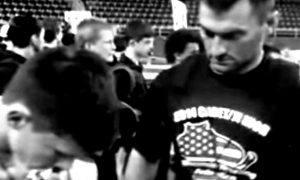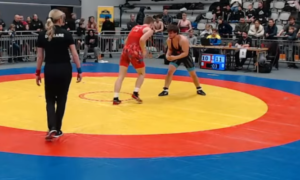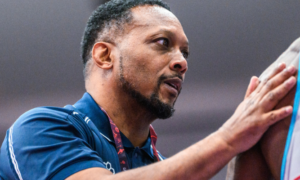Back in September when United World Wrestling announced the removal of ordered par terre for Senior Greco Roman competition, we decided it would be a good idea to get feedback from various US wrestlers. After all, the prevailing theme surrounding par terre and passivity was that it was an area the Americans struggled in. So naturally, forced par terre’s removal was roundly cheered and optimism was high.
Then the proceeding few months unfolded. Multiple events, including the World Wrestling Clubs Cup and the Non-Olympic Weight World Championships in Budapest, Hungary did not offer up dynamic displays of scoring and activity (although to be fair, the 2016 US Nationals generated a fair amount of excitement). But nevertheless, the powers that be in Switzerland must have seen enough to swing them back the other way. There is a list of reasons for the rule change worth speculating over, but all we know for now is this — forced par terre is coming back, and supposedly soon.
Also on the docket are new weight classes starting in 2018. 55 kg, 60 kg, 65 kg, 70 kg, 75 kg, 80 kg, 85 kg, 90 kg, 100 kg, and 130 kg. 2020’s Tokyo Olympics will still only host six weight classes, but a couple of extra non-Olympic weights along with a more logical ascension seems like a step in the right direction.
Since we asked for responses from US athletes when the previous rule change was announced, it seemed only fair to do so again. This time around, we went for some different voices and a positive attitude can be detected. That doesn’t mean a couple of the answers won’t surprise you.
US Greco Roman Reactions to 2017 UWW Senior Rule Changes
Alex Sancho (66 kg, NYAC-OTS) “It’s great. It’s good for the sport of Greco, you know? Par terre is very important for Greco and it is a position I like a lot. I like my straddle from par terre because once you get down there, you’re lifting a guy off the mat, you’re scoring or either tech’ing a guy, it doesn’t matter.”
“(Without forced par terre) I saw a lot of passivity points being called out. Not that many takedowns, more passivity points. Once a foreign opponent or a Russian takes you down, he is going straight into par terre and that is his go-to, getting the match over with. Now that par terre is coming back, I think you are going to see faster matches and a lot more scoring. It’s going to be more exciting.”
On the new weight classes: “It’s not really a big deal for me, it’s just one kilo, 66 to 65. But now that I am getting older, it is getting a little harder to cut weight, so I have just to be disciplined with what I eat and I should be fine. 65 is going to be my weight class if they make that rule change. I will fluctuate from 65 to 70, I’m not really scared of any other weight class above 65 anyway. We’ll see where it goes after this year.”
Dalton Roberts (59 kg, NYAC-OTS) “I was excited, actually. I love wrestling on my feet and all, but it seemed as if the matches were a little more dull with no forced par terre and people were just fine, Oh, I’ll give up a passivity and one, it’s not a big deal. The punishment for my passivity isn’t so high that I’m freaking out. But now, it’s, Hey, if you’re passive, you are getting put down and the match can end right there. The match isn’t going to end with a one-point caution. It is going to make wrestlers more active I think, because they don’t want to be passive and they want to instead, force passivity. If I get a shot on top, I can end the match right here.”
On the new weight classes: “I am going to play it out. I’m at the point now where I can gain weight and wrestle. It’s hard to say what I am going to walk around at a year from now, if I’m strong, if I feel good, and if I feel I could win it at 55 (kg) or 60. It is just about size and where I’ll be a year from now. I do want to get to the weight room more often. I’m not very heavy for 59. For Schultz, I’ll probably only cut two or three kilos, maybe two if I’m light. I’ll know in a year, I’ll just play it as it goes.”
Alec Ortiz (75 kg, Minnesota Storm) “I’d say the biggest thing was just not being surprised. It was almost like a non-reaction because for better or worse, the rules have always been in-flux so much since I can remember competing. The first rule change I can remember was when they went from two solid periods of two minutes and to win, somebody had to score three points. You know, old school clinch at the end of the first period. And from there, they went to the best of two out of three rounds, and it seemed like after that, at best we could get two years but sometimes it would be shorter periods before they were tweaking or adjusting the rules.
“So it’s kind of just been more casual at this point. It almost seemed like we were due for a rule change even though we just had another one prior. I would just say, to put it simply, I wasn’t really surprised.”
On the new weight classes: “I think it’s a positive thing. Anytime we can get more guys on the mat and more opportunities to watch high-level competition, it’s positive for our sport. I know there does come a point where it’s over-saturation. In professional boxing, there are you know, four or five organizations and every four weights there is a new champion, guys are five-division champions even though they only moved up 15 to 20 pounds. I think it’s good for us to have more weights and I don’t think we’re close to having over-saturation.
“I mean, with ten weight classes, it puts us at the amount of weights college is at, so it puts us at a pretty good dispersion of athletes and I think it eliminates those situations where guys were cutting too much weight because they’re “tweeners.” I’m sure there are plenty of guys who are looking at these new weight classes and are relieved that they don’t have to necessarily cut as much weight as often. They can fit into a more natural weight class and that is going to lend itself to better matches and therefore, better viewership. We’re going to be more exciting because we’re not going to be killing ourselves to make weight, as opposed to being exciting and being explosive.
“I think since the long-term goal is to make an Olympic Team, even with these new changes and additional weight classes for the Olympics would be at the earliest 2024, I kind of made the decision prior to this last trip going down to 71 kilos that afterwards I was pretty much going to stay at 75 and just try to make myself stronger and go for that weight class. Hopefully get these trips overseas and even in the states against high-level guys that I am going to be doing battle with the next couple of years. In my mind, it wasn’t much of an advantage to be jumping down to 71 and then back up to 75 as opposed to staying solid at that weight class and kind of try to establish myself at that one spot. So it’s a good opportunity for a lot of guys and of course, plans change, but I think I’ll be sitting pretty solid at 75 for the foreseeable future.”
Randon Miranda (59 kg, NMU-OTS) “Honestly, I think forced par terre (coming back) will be a good thing. We can’t be afraid of that position, so we’ll just have to live with it now and I think that’s good. I think forced par terre is going to help America and the sport overall, if that makes sense. I’m excited because if you push the pace and get on top, you should be scoring points. As for me, I think it is going to help because the referee is not going to be controlling the match. Before, it was too much in the ref’s hands. Now it’s like if you’re down, you have got to score. So I think it’s going to be good.”
On the new weight classes: “It’s awesome news. I was so excited, I was so happy. I don’t really know who is going to cut down, but me wrestling 55 kilos for the Juniors this year and then jumping into 55 kilos as a Senior is going to be good because now I don’t have to worry about getting so big or worrying about my weight. I’ll be fine at 55, you know? I’m excited about it.”
Ryan Hope (85 kg, Cliff Keen) “Initially, I laughed, because my thought process is, Come on guys, let’s get our shit together already. But other than that, I look at it as wrestling is wrestling, whatever the rules are. Whether it’s without shirts on and we’re in our underwear, if they want us to walk around on our hands, it’s not going to matter — we’re going to wrestle. I think as long as the general understanding of wrestling is still there, I will always wrestle. Now, that changes how the sport is understood though because fans are going to be like, Wait, why did they just stop the action? They are going to go down again? I think it brings back some confusion though if you asked me, I don’t think the sport is confusing at all. But I’ve also wrestled for how many years?
“I guess when I look at it, it’s not really a concern for me. I think as a country we need to get our acts together and realize that par terre was never gone. It still won and ended matches, you know? Now it’s just more apparent. It’s like going from high school where top and bottom were important to college, where it’s a very big difference. You could either score points or ride a guy out, or you can be ridden out and lose on a tiebreaker. And I think that is how par terre is. You either learn to wrestle par terre or you get out of the kitchen.”
On the new weight classes: “I agree with Greco and freestyle having the exact same weights, not because I think it makes it easier for guys to jump between both styles. I’m only saying it because why the hell, for whatever reason, would they be different? So I agree in having the same weight classes as we do. On the other part, the sport had ten weight classes back in the day, but I think it was all the way down to 50 kilos or something like that. So I think it’s great to an extent. It will bring more champions and more medals to the table, which also brings more stories, more backgrounds, and more interest from the general public because they may relate to an athlete who competes at weight class like 100 kilos compared to 96, or whatever.
“On the other hand, I am also concerned it may water down the World Championships in a way. I’m not going to say certain weight classes, but it has been that way since they created it. It’s one of those things where you’re like, That guy just won the Worlds at that weight class, but at the other two weight classes he hasn’t done anything. Which is not to say that the weight is just better for him, because it could be. But the competitors he is wrestling against might not have been top-tier, either. They have been decent guys, but never top-tier. So I’m concerned it could water down competition, but I always believe that the core six Olympic weight classes will stand true no matter how watered down the other weight classes might be, because you’re always going to have the mentality that I do, which is, Why wrestle at a non-Olympic weight when you can get used to the weight class you’re going to wrestle in at the Olympics?
“I’m looking towards the future, I’m not thinking of it like, Well, this year I can win a title at this weight class and I can win one at this weight again, but when it comes to the Olympics I am going to have to get used to another weight. I’m thinking of it as a patience game. I look at it like I am going to have to win the Worlds at my weight class so I can win the Olympics at my weight class.”
Austin Morrow (66 kg, NYAC-OTS) “My first thought is that I was actually kind of happy about that. We have (two-time World medalist Andy) Bisek in the room now to coach us in par terre and that’s huge for us. But I think I’m probably better on top in par terre than I am on my feet. I score a lot more points from there, so I kind of liked it. I was actually very surprised. Didn’t they change the rule like what, three months ago or something? It wasn’t long ago, so I didn’t think they’d be like, Okay, let’s switch it back.
“I remember reading a piece here talking about the Golden Grand Prix and the new, I guess now ‘old’ rules, and how without forced par terre there were less tech’s and less points being put up. Whereas, under the old rules, there was more scoring. Yeah, some might say there was suspicion then because the refs had a lot more say and a lot more power to end matches, but you were seeing points being put on the board.”
On the new weight classes: “I actually really like that, it gives some of the smaller 59 guys a chance to really come into their own. For instance, Dalton (Roberts) and Randon (Miranda). Don’t get me wrong, those guys are scrappers and they can brawl with anyone at 59, but give them a weight class like 55 and they can really shine. Dalton can make that weight and be a big 55 instead of a small 59, so I think it gives some of the smaller guys opportunities. I personally like 65 as a nice fit because 66 kilos was never a struggle for me. 65 fits perfectly.”
Joe Rau (98 kg, Minnesota Storm) “I was happy because first off, I love par terre, it’s a huge part of my game. But I mean, I wasn’t too upset, I’ve dealt with tons of rule changes in the past, so it’s just adapt or die when it comes to rule changes, you know? Everybody who is good at this level has had a wide variety of rules that they have wrestled. So you know, I’ve got to make new game plans, I have to score on my feet all the time, which I was always doing and trying to do. But par terre is a such a huge part of my game, so to hear that they brought it back made me happy.
“My opinion on it is you could train to be good at defense, you could train to be good on top. If you’re not doing that, then that is your fault. You can’t train and then it’s out of your hands when it comes to passivity in a tight match. You get hit, he gets hit, you get hit, and that’s the match. And I don’t like that, there is too much control in the ref’s hands. Put me down, make them score on me to win. These rules with no par terre, if it’s a deadlocked tie, you’re being punished for being the aggressor. Because if you are the aggressor in a match, he is going to get hit for passivity first in the match and then if you don’t score, you get hit. Then in the second period, he gets hit and if you don’t score, you are going to get hit. Now you’re losing 2-2 even though you were the aggressor but didn’t score. That is what I don’t get. There are tight matches sometimes and you don’t always need to call passivity.”
On the new weight classes: “I was really happy. It is just ludicrous that at the highest level, the less weight classes we have. Because it doesn’t get easier to cut weight. If anything, it gets harder. We’re fully grown. If you want to change weight classes, it’s like 30 pounds in between. In high school there are 14 weight classes, in college there are ten, and for us there are six Olympic weight classes and the two non-Olympic weights. There are not enough weight classes. There are “tweeners” who have to go up or go down and me, I’m sort of a sponge (laughs). I can extremely manipulate my weight as far as gaining or losing weight.
“But I’ve always said if there is something around 90, 92, or 94 kilos, that is where I’m at my best. 90 is a pretty awesome weight for me, so it did affect me personally. That is something I am definitely thinking about. And for little guys, that is just ridiculous, that they would take away 55 and 60 and turn it into 59? That is just insane. I thought it was awful when that happened.”
















